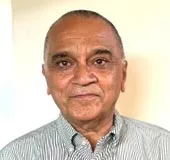Expectations of the post-Covid world being qualitatively better than before are misplaced. If anything, it is likely to be nasty, brutish and permanent, to misquote Hobbes – the 17th century English philosopher of “Leviathan” fame.
There are two ways India could slip into a Hobbesian dystopia. First, Covid could rob us of the economic advantages which domestic migration brings as fear of disease, job loss for locals and ancient biases meld into an anti-migrant rant.
Second, whilst we live with Covid for the next year till a vaccine is ready, it cannot be business-as usual. Are we feeling the stones beneath our feet to define our path across this new and treacherous river?
Meghnad Desai (Nurse the Constitution) flags the emerging dangers of fragmented decision making by overwhelmed Union, state and local governments, battling public health and economic crisis simultaneously. The case of migrants is foremost.
None would seriously subscribe to the Shiv Sena’s 1960s narrative of “Mumbai for Marathas” aimed first at Gujarati-Panjabi dominance in business and later in 1980s at the influx of migrant labor from UP and Bihar. But just as certainly the governmental instinct in a downturn, is to ban entry of “outsiders” to preserve the wages for local workers.
Already, because of the panicked exit of migrants, wages are higher by up to 50% for local workers in Panjab and West Bengal, in time-bound agricultural operations. Banning migration is economic nonsense. Doing so lowers net employment as a business – especially in labor-intensive enterprises- flees to where labor is cheap. Our 4 million “good jobs” in the tech BPO space evidence this economic reality much to the detriment of workers in rich countries.
The government should swiftly adopt a “Rights of Domestic Migrants Law” which identifies and defines the rights of each type of migrant. When and how, for example, could a migrant convert herself into a local resident and what are the differentiated rights of temporary versus permanent migrants with respect to social benefits, their right to vote and employment, including in government. Also, what must they do – compulsory registration for easy identification in voter lists, digital transferability of social benefits etc. Such an initiative can reassure migrants that “migration” for employment is not dead in the water.
Managing migrant welfare should become an explicit duty of social protection departments in the Union, state and local governments. Mandating who is responsible, allocating money and personnel is vital to benefit the “class interests” of migrants – 31% of population -if moving away from one’s birthplace is the metric and 19% – if only cross-district and state border movements are defining metrics (2001 Census).
Over the last two decades, since 2001, the extent and profile of migration is sure to have altered. Many original migrants might have settled down in their new homes – think about the chawls of Mumbai and the unregulated colonies of Delhi. Incidentally do watch “The Lift Boy” on Netflix for a sugary look into the life of one such family.
A biometric, Aadhar type residence-based National Population Register – currently targeted for final verification in 2021 – can help. A caveat – it must be expressly inclusive and not seek to exclude anyone living in India – unlike in Assam- or Indians who live outside.
In the absence of a verifiable database underpinning rights and social protection benefits, well-meaning, do-gooders (Food Before Cash )have already ratcheted up the demand to abandon the ongoing targeted direct transfer of benefits and continue the leaky and expensive distribution of free food. Yes, we have food stocks. But no fiscally strapped government has the luxury of working like a charity.
Having said that, no one needs to go hungry. District administration has distributed cash relief for years, based on physical verification. The full resources of the District Collector should be diverted over the next year to oversee the relief programs.
Government should freeze all district officials in position, cancel all promotions and leave for one year, till the epidemic abates. In situ experience is vital. One-half of secretariat employees should be rostered, where they live, for field emergency response duties especially important as the lock-down is eased and relief supplies enhanced. Government must demonstrate that it has mobilized for an emergency not simply by criminalizing those unfortunates caught violating poorly thought through and frequently conflicting, emergency regulations.
How India navigates the Covid response will determine the future credibility of the three layers of government; the strength of the national glue binding us all and our national security. Engorged caste and class conflicts are to be expected when employment gets constrained and income cut-backs a near certainty.
On display till now is anything but the Gujarat model of effective governance. It is instead a shambolic, disjointed, made-up-at-the moment, fire-fighting attempt at doing something – anything – even if it means doing the wrong thing.
Consider, first the inexplicable failure of the systems which red flag such emergencies early. Second, the impracticality of the first response – a copy-cat (China) model to “stamp-out” the epidemic via an instant, all-India lock-down. Even in war, consultation, if not consensus across commanders, is necessary. Consensual decisions across national and state governments would have served us better.
Dynamic but measured restriction of the usual freedoms in tightly defined hot spots, within big urban areas, with enhanced border surveillance like temperature tests – Kerala started this in late January 2020 and associated compulsory quarantine facilities, could have graduated the spread better, with vulnerable groups counseled and cautioned to stay isolated at home.
Consider also, the absence of an organized institutional response from the National Disaster Management Authority (NDMA), statutorily created in 2005, for disasters, including epidemics, which overwhelm local capacity. It has either been side lined or its mechanisms grown rusty with disuse.
The NDMA is designed for close cooperation and active participation at all levels of government much like the apparatus of the Election Commission, which works very well. Both institutions engender the spirit of cooperative federalism through their tiered structures, reaching down till the local levels. Revitalizing NDMA will be crucial to sustained management of the Covid response over the next year.
It will be tough to evade Hobbes’ dire, self-fulfilling prophecy of greedy humans perpetually jostling to be first-in-line before an omnipresent State unless institutional decay, bureaucratic atrophy and political chicanery are replaced by more enlightened public interest. Emergencies demand decisive governments. But not of the kind we had between June 25, 1975 and March 21, 1977.
This commentary originally appeared in The Times of India.
The views expressed above belong to the author(s). ORF research and analyses now available on Telegram! Click here to access our curated content — blogs, longforms and interviews.




 PREV
PREV


